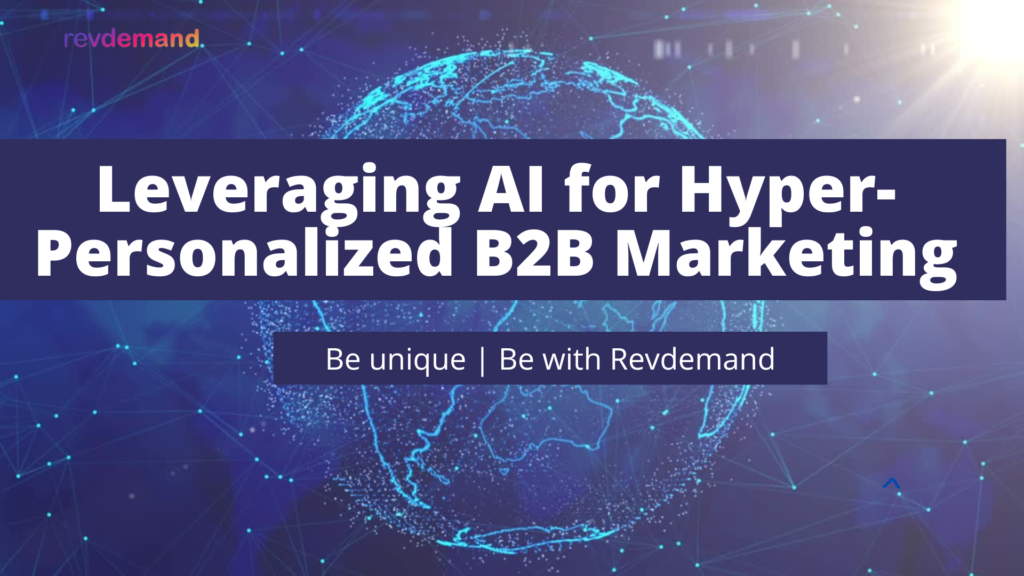leveraging Ai for hyper-personalized b2b marketing

In the rapidly evolving landscape of B2B marketing, staying ahead of the competition requires not just innovative strategies but also cutting-edge technology. Artificial Intelligence (AI) is emerging as a game-changer in this domain, offering unparalleled opportunities for hyper-personalization. By harnessing AI, B2B marketers can create tailored experiences that resonate deeply with their target audience, leading to improved engagement, higher conversion rates, and enhanced customer satisfaction.
The Rise of AI in B2B Marketing
AI’s influence on B2B marketing is profound, enabling marketers to move beyond generic approaches and towards more nuanced, data-driven strategies. Here’s how AI is transforming B2B marketing through hyper-personalization:
1. Advanced Data Analytics
AI excels in processing and analyzing vast amounts of data quickly and accurately. By leveraging machine learning algorithms, AI can uncover patterns and insights from complex datasets that would be impossible to identify manually. This allows B2B marketers to:
- Understand Customer Behavior: Analyze browsing patterns, purchase history, and engagement metrics to gain a comprehensive understanding of customer preferences.
- Segment Audiences Effectively: Create detailed customer segments based on behavior, demographics, and interests, leading to more targeted marketing efforts.
2. Dynamic Content Personalization
Gone are the days of one-size-fits-all content. AI enables real-time content personalization, adapting messaging and offers based on individual user interactions. This dynamic approach includes:
- Personalized Emails: Crafting tailored email content that aligns with each recipient’s interests and past interactions.
- Custom Website Experiences: Adjusting website content and recommendations based on user behavior and preferences, providing a more engaging experience.
3. Predictive Analytics
AI-powered predictive analytics offers a forward-looking perspective by forecasting future customer behavior and market trends. This capability allows marketers to:
- Anticipate Needs: Predict what products or services a customer might be interested in next, enabling proactive engagement.
- Optimize Campaigns: Adjust marketing strategies in real-time based on predicted outcomes, improving campaign effectiveness.
4. Automated Lead Scoring
Lead scoring is crucial for prioritizing sales efforts, and AI significantly enhances this process. AI-driven lead scoring models evaluate multiple data points, such as:
- Engagement Levels: Assess how actively a lead interacts with your brand, from email opens to website visits.
- Behavioral Data: Analyze past behaviors and interactions to gauge the likelihood of conversion.
This automated approach helps sales teams focus on high-potential leads, improving efficiency and conversion rates.
5. Enhanced Customer Journey Mapping
AI aids in mapping out the customer journey by tracking and analyzing interactions across various touchpoints. This provides valuable insights into:
- Customer Touchpoints: Understanding where and how customers engage with your brand throughout their journey.
- Optimization Opportunities: Identifying areas for improvement in the customer experience to ensure a seamless journey from awareness to conversion.
Implementing AI for Hyper-Personalization
To leverage AI effectively for hyper-personalization in B2B marketing, consider the following steps:
-
Invest in AI Tools: Choose AI-driven platforms and tools that align with your marketing objectives and integrate seamlessly with your existing systems.
-
Focus on Data Quality: Ensure your data is accurate and up-to-date, as AI’s effectiveness relies on the quality of the input data.
-
Develop a Personalization Strategy: Define how you will use AI to personalize content, offers, and interactions based on customer insights.
-
Monitor and Optimize: Continuously track performance and refine your AI models based on feedback and results to enhance their effectiveness.
